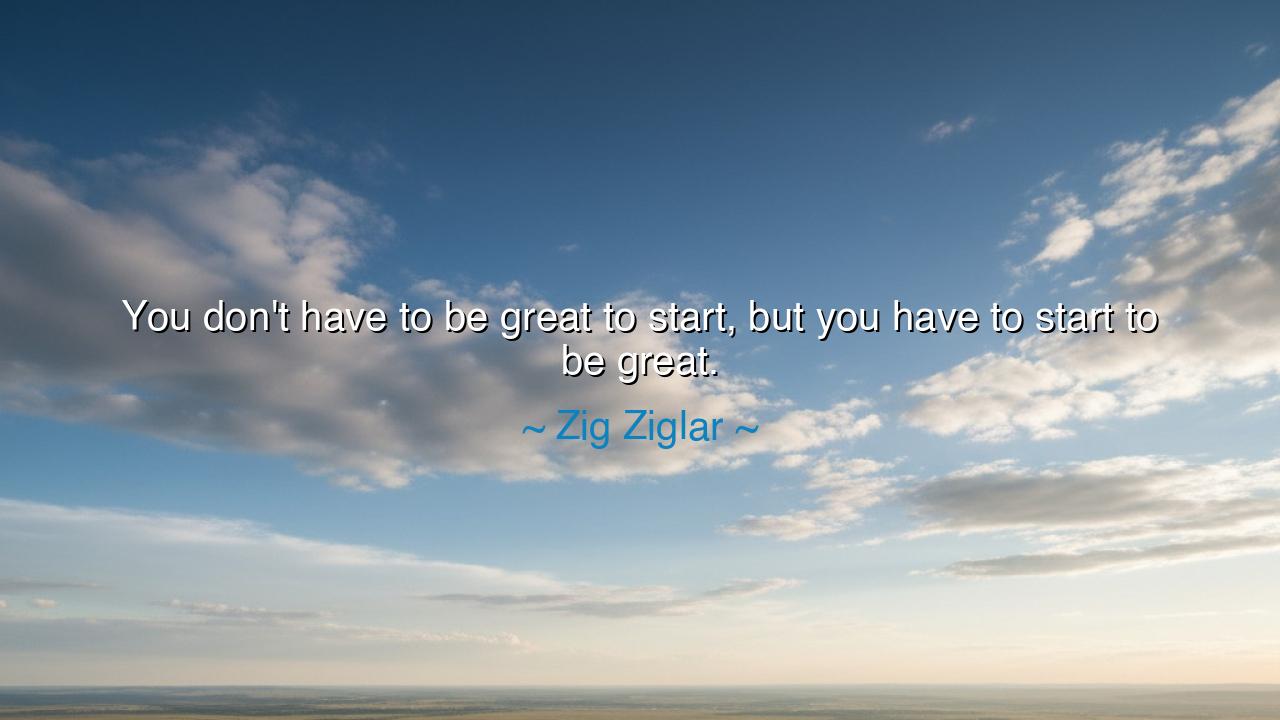
You don't have to be great to start, but you have to start to be






Hearken, children of the ages yet to come, and absorb the enduring wisdom of Zig Ziglar, who proclaimed: “You don't have to be great to start, but you have to start to be great.” In these words lies a timeless truth: that action precedes mastery, and courage precedes accomplishment. The ancients knew well that the journey of greatness begins not with skill alone, but with the willingness to take the first step, however humble, into the unknown.
Ziglar reminds us that perfection is not the prerequisite for endeavor; rather, the act of beginning is itself a seed from which greatness may grow. The philosopher Aristotle taught that virtue is cultivated through repeated action, that excellence emerges from the habit of doing. To start is to plant the first stone upon which towers of achievement may rise, and even the smallest beginning is the foundation of monumental success.
Consider the life of Thomas Edison, who sought tirelessly to bring light to the world. He did not begin as a master inventor, nor did he possess all the knowledge required for his discoveries. Yet by starting—by experimenting, failing, and persisting—he transformed his vision into reality. Edison embodies Ziglar’s wisdom: greatness is born from bold action, relentless effort, and the willingness to begin despite uncertainty.
The ancients often celebrated the courage of initiation. In Greek myth, Odysseus did not achieve his legendary feats before setting sail, nor did Achilles become great without entering the battlefield. The first step into challenge, the first act of engagement, is what sets the course of destiny. Ziglar’s words echo this universal principle: one must act, daring to step forward, to claim the path that leads to excellence.
Yet beginning is not a solitary act; it requires faith in one’s own capacity to grow. Each small endeavor, each tentative effort, builds skill, wisdom, and resilience. The Roman historian Livy tells of Cincinnatus, a farmer called to serve as dictator in times of crisis, who embraced the role despite his humble beginnings, guided by courage and duty. Through action, greatness emerges, as the ordinary is transformed by resolve.
From this reflection, a lesson emerges for all seekers: hesitation is the enemy of potential, and waiting for perfection only delays the flowering of ability. Those who achieve greatness recognize that the first step, no matter how small or uncertain, carries within it the promise of mastery. Ziglar teaches that boldness in beginning is the crucible of future excellence.
Practical guidance flows naturally: identify the path you wish to pursue, take the first deliberate step, and continue to act with patience and determination. Embrace the early stages of learning, for skill and wisdom grow through experience. Celebrate progress, however incremental, and remember that the journey of greatness is paved with beginnings.
Children of the ages, let Ziglar’s teaching illuminate your hearts: you need not await perfection to start, but you cannot achieve greatness without action. Step forth boldly, act with courage, and allow persistence to transform effort into mastery. In the willingness to begin lies the spark that lights the fires of achievement, and in action, the soul finds its ascent toward true greatness.
If you wish, I can also craft a more narrative, cinematic version, evoking the first steps of heroes and inventors, making Ziglar’s wisdom feel like an epic oral teaching perfect for audio storytelling. Do you want me to do that?






AAdministratorAdministrator
Welcome, honored guests. Please leave a comment, we will respond soon